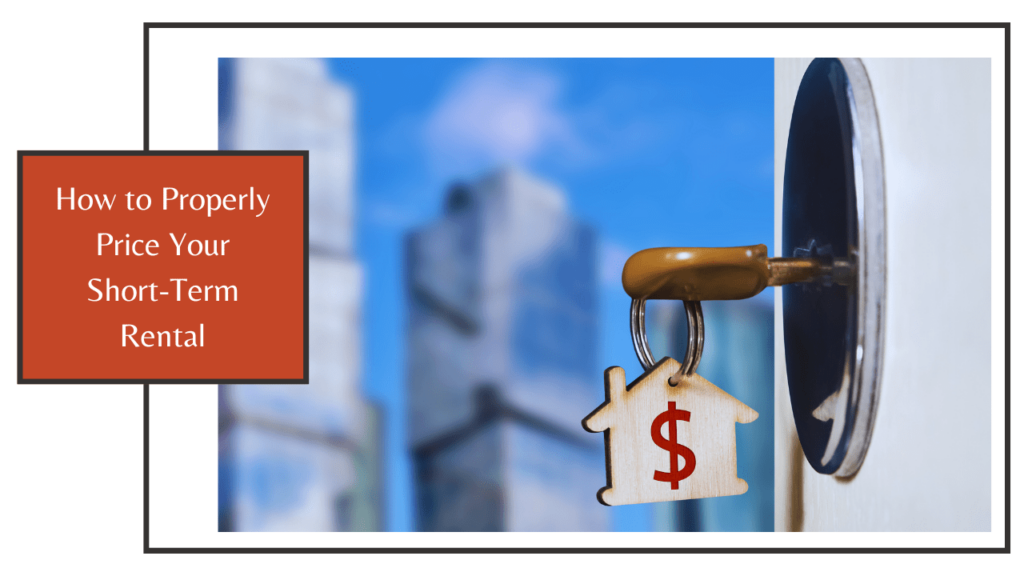How to Properly Price Your Short-Term Rent

Short term rentals provide a number of benefits. You’re earning more on a per-night basis, for example, and you can use the property yourself when you need to or want to.
Your profitability and your ease in attracting guests will depend on accurate pricing.
The right price will depend on a number of factors, including:
- Length of stay
- Season
- Your property’s location
- Your property’s amenities
- Your property’s condition
- Strength of the market and competition
You don’t want to price your property too low. When you do that, you can expect to keep it occupied, but you’ll also be leaving a lot of cash on the table. If you price your property too high, however, you’ll find that visitors and guests choose other rental homes over yours. A higher than average price needs to be justified by unique amenities or special services.
To effectively price your rental property for short term guests, you’ll need to understand the local market, the guests who are likely to book, and how your property compares to all the others that are available.
First, Decide on a Pricing Structure
Will your price be all-inclusive, or will you charge extra for utilities? Will there be a cleaning fee?
This is what you have to decide before you attach a price to your short term rental home. If you’re planning to include utilities in the rent, you can charge more on a weekly or monthly basis. However, if you have guests staying for three months in the winter, you can expect higher heating bills, and you might want to set your normal rental rate and ask them to pay for utilities separately.
Guests will consider this when they’re choosing a property. Some will prefer having a visual breakdown of costs so they know exactly what’s included in the rent they’re paying. Others may feel like they’re being overcharged when you start to throw in cleaning fees and extra charges for use of amenities like pools or fitness centers.
You’ll have to consider whether you want a damage deposit as well. Make these decisions before you set the price so you don’t lose money.
What Does the Season Say about Your Rental Price?
Season says a lot, especially when it comes to pricing.
National holidays are an important consideration when you’re pricing a property as well, because you’re likely to have more interest from visitors and vacationers.
Occupancy rates are different at different times of the year, and you can plan your pricing around those seasons. You’ll charge more during the high season and less during the low season. Make sure you have a clear understanding of how those seasons work in the Vancouver region.
Local events will impact the price you place on your short term rental. If there’s a festival or a convention in town for a particular week, you can drive your prices up for that period.
Setting competitive rental prices for vacation homes requires knowledge of both local trends and peak seasons in order to maximize profits while remaining attractive to renters. Being aware of seasonal changes along with any local events or attractions will help you determine what price range will be most effective for attracting renters without leaving money on the table. The process of pricing requires a year-round look at what’s happening and who would be most likely to spend some time in the area.
Analyze the Competition’s Pricing
There are likely several other short term rental properties in your neighborhood, and some of them may even be similar to yours. Check out what their rates are. You can go online to any of the popular rental sites that you might use yourself. Or, you can talk to a local property manager in Vancouver who can share accurate data that’s been collected over time.
Before you attach a price to your property, consider these factors:
- Competition. Are there a lot of short term rentals in your area? If so, you’ll have to price your own home more competitively. If you’re pretty unique, however, in renting out for periods of weeks and months instead of a one-year lease, you can likely drive your price a little higher.
- Property condition. Compare what you have to offer to the other homes on the market. You should be providing modern upgrades and updates if you want to earn maximum rents.
- Consider your amenities. If you have a hot tub, for example, you can certainly charge more.
You want to be in the same range as your competition. When guests begin searching for a short term rental, they will likely search according to budget, which means they’ll set filters based on price. You want to make sure you land in the area of what they generally expect to spend.
What Makes Your Vancouver Property Different?
As you gather information on competing properties, think about what makes you unique. This is the feature or the factor that will allow you to raise your price a bit above market.
You might not even realize what it is about your property that makes it more valuable. Here are some things that would drive up your rental rate:
- Amenities. We mentioned the hot tub. If you offer fenced outdoor space, an outdoor dining area, or the use of bicycles or kayaks, your potential guests might be willing to pay more for your property.
- Unique design elements. Generally, it’s best to keep your design elements and your aesthetic as neutral as possible. You want to appeal to as many potential guests as possible. However, if there’s something interesting about your property, you could earn more. Artwork from local artists, for example, would make a difference, or especially modern furniture.
- Location. If you’re in a walkable neighborhood or close to necessary travel routes or the airport, you will be able to earn more. Short term rental homes that offer access to parks and nature, the action of downtown, or popular tourist attractions and landmarks will earn more than a property that’s more remote.
If you provide outstanding Wi-Fi or a workspace, you’ll appeal to remote workers. When you have child-friendly amenities such as high chairs and cribs, you’ll appeal to families who are traveling with little ones. Thoughtful additions like this will allow you to set a rental value that’s a bit higher.
Price According to Length of Stay
The nightly rate you charge guests for a three-night stay should be much higher than the nightly rate you charge guests who are settling in for three or four months. You have to factor in the costs of cleaning and maintaining the property when you are constantly turning it over between guests. It will cost you more to manage, especially short term guests.
One way around this is to set a minimum stay. You can say that your property is only available for a minimum of seven nights, for example. This will generate more income and less work for you.
Guests who book for long periods will absolutely expect a discount, and you should provide it. Just don’t cut your price too much. It will rob you of your ability to make more money on multiple shorter stays over the same period.
Start with a Higher Price and Then Offer a Discount
One pricing strategy that you might find helpful is showing potential guests how much they’re saving. For example, if you’re charging $200 a night for your property, and you are willing to offer a discount on stays that are 30 days or longer, show the math. You can tell them that the listing price is $6,000 for the month, but you’re willing to let them book their stay for a 30-night minimum for 20 percent less, or $4,800. When they see the numbers side by side, they feel like they’re getting away with something.
There are additional ways to dangle a pricing carrot in front of a potential booking in order to close the deal.
- Offer a discount for a last-minute booking. If you know you have three weeks coming up where you don’t have any guests booked, offer a half-price stay for two of those weeks. You’ll get some attention.
- Free passes for local events or discount cards and tickets to local shops, coffeehouses, and bars.
- A discount for repeat renters. Always let your guests know that you’ll not only welcome them back, but welcome them back for less. You can offer a referral discount, too. If they recommend your property to a friend who books, you can give that initial guest a generous discount.
There are several different strategies you can employ when you’re pricing your property for short term renters, but you’ll have to consistently monitor the market, which changes almost daily. Make sure your price is clear in all of your marketing materials and on your listing platforms.
If you’re not sure where or how to set your price, we can help. Please contact us at Utmost Property Management. We manage homes for investors like you in Vancouver, Camas and the Greater Clark County area.

